Does anyone know who these ladies are and which department they are working in?
Which year was it taken?
Get in touch if you do…
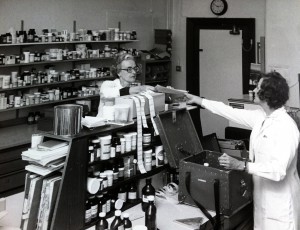
Mystery Photo
Does anyone know who these ladies are and which department they are working in?
Which year was it taken?
Get in touch if you do…

Mystery Photo
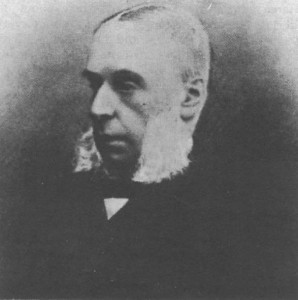
Dr Henry James Paine
Buried in Cathays, Section L is Dr Henry James Paine (1817-1894). Dr Paine is best known for his achievements in bringing sanitary conditions to Cardiff and the seamen’s hospital, The Hamadryad.
In 1847 the Rammell Inquiry stated that Cardiff had dangerously polluted water and no sanitation. Typhoid was rife and Cholera outbreaks common. After the inquiry Paine was
appointed the Medical Officer and installed a £200,000 deep drainage sanitation system. The population of Cardiff grew rapidly with Irish immigration to escape the Famine. Some
200 died immediately of various diseases with over 500 people from this area dying of Cholera by 1854. Through Paine’s work by the 1866 Cholera outbreak only 44 people died.
Flatholm Island (near Barry) was acquired for the reception of immigrants with Cholera so that the disease did not enter the town. Paine is also renowned for reducing the effects of
Smallpox in Cardiff. Through his pioneering ideas to keep Cardiff free from disease and improve sanitation, it is estimated that Dr Paine may have saved over 15,000 lives at the time
of his retirement in 1887.
Paine bought and fitted out the Hamadryad at a cost of £1414.00 to house 60-65 in-patients with a doctor, medical staff, matron, nurse and cook. The ship was grounded on “Rat Island”, an area that later came to be known as Tiger Bay. Voluntary contributions kept it going and a 2 shilling contribution was extracted for every 100 tons of registered shipping that entered Cardiff. By 1871 the ship became the only centre in the city for treating infectious diseases and the ship opened its doors to the ill of Cardiff. To celebrate Queen Victoria’s Diamond Jubilee, a permanent hospital building was proposed which was eventually taken under the umbrella of the National Health Service.
Taken from the Cathays Cemetery Heritage Trail
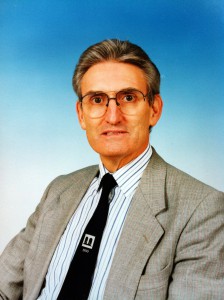
Dr Dafydd Huws
It is with great sadness that we have to report the death of Dr Dafydd Huws at the age of 75.
Dafydd was appointed Consultant Psychiatrist at Whitchurch Hospital in 1971 and retired in 1996. He had been a medical student in Cardiff and also undertaken his post graduate training in the Cardiff area.
His consultant responsibilities including looking after the day hospital at Tegfan, as well as providing general psychiatric care to an adult population. Prior to retirement he had been clinical director and subsequently medical director to the Cardiff Community NHS Trust.
It is almost impossible to condense into a few paragraphs his life and work as a psychiatrist, as well as conveying something of the person and character that he was. His energy and enthusiasm permeated everything that he did. Dafydd had a special interest in eating disorders and psychosomatic illness. He never failed to be intrigued by the different ways people and personalities presented their illness. He was genuinely interested in the human condition and how we cope with stress and adversity. His approach was not always conventional, but he was usually successful, I think its fair to say that he would not have felt comfortable working in today’s managed care system.
One of his strengths was as a communicator; He often used analogy to explain concepts. One of the more enduring in explaining psychosomatic illness being the overfull suitcase, which if the contents were not allowed to bulge out of the front, would manifest as pressure in a different part of the container. He was in demand as a lecturer and speaker, but also by the media who sought his view when any story of a psychiatric relevance broke.
He was a great mentor for any young psychiatrist, and always ready with good advice, one of his favourites was the assertion that the secret of a long career in psychiatry was to do something completely different – and he did that with gusto. He was an active member of Plaid Cymru, their first councilor in Cardiff, and one time party chairman. He ran several farms, and enjoyed relating the story and how he used to bring back orphaned lambs from his farm near Aberystwyth and keep them in the residency in medical quarters during the working week, and the great lengths he would go to in order to dodge the cleaner. His interest in renewable energy he later turned into a business, owning and running one of the first wind farms in Wales.
Dafydd perhaps more than anything else was a proud Welshman, and was unflinching in his support of the language and culture, this naturally extended to his patronage of the Welsh Psychiatric Society and y Gyndeithas Feddygol. He had a keen intellect and wrote Welsh poetry and enjoyed nothing better during work breaks than discussing philosophy and theology with his colleagues.
During his final illness he did a radio programme. Interviewed in Welsh he talked about his life and career. He talked very openly about his cancer and how it had affected him, but commented that he would not have wished to have lived without it. He felt that the experience had in many ways changed him and enriched his being – a comment typical of the man who could see the positive and value in most things.
His funeral took place in Bow Street, Aberystwyth on the 9th of July. He leaves a widow Rhian, and five children, two of whom have followed him into the medical profession.
Thanks to Dr John Lewis for this post
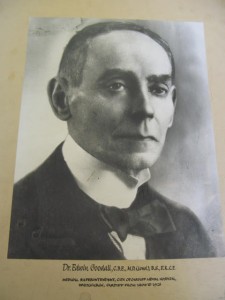
Edwin Goodall was the first medical superintendent of Cardiff City Mental Hospital (Whitchurch Hospital). He was appointed in 1906, two years before the hospital was opened and retired in 1929.
Dr Goodall trained as a doctor at Guy’s Hospital in London before pursuing further training in Germany at the University of Tübingen where he was a contemporary of Alois Alzheimer. Before moving to Cardiff, Dr Goodall was Assistant Medical Officer and Pathologist at the West Riding Asylum in Wakefield before becoming Medical Superintendent at the Joint Counties Asylum in Carmarthen. In Carmarthen he achieved the notable feat of learning Welsh in six months. His appointment in Cardiff followed a rigorous selection process in which forty-two candidates had applied.
Dr Goodall’s achievements in Cardiff were many. He co-authored a textbook Insanity and Allied Neuroses with the eminent London psychiatrist, Sir George Savage. He founded a very strong research team that pre-empted the establishment of the Medical Research Council Unit that flourished well into the 1980s. His team was responsible for many research papers investigating the biological basis for mental disorders.
Personal recognition came by way of his being appointed co-editor of the Journal of Mental Science (now the British Journal of Psychiatry). He served two terms as President of the Neurology and Psychiatry Section of Royal Society of Medicine (1911 and 1928) and a term as President of the Medico-Psychological Association (now the Royal College of Psychiatrists 1923). In 1914 he gave a series of prestigious Croonian lectures to the Royal College of Physicians and in 1927 delivered the eighth Maudsley Lecture to the Royal Medico-Psychological Association.
In his work in the hospital Dr Goodall developed a career structure for male Nurses rather than seeing them as merely attendants and was the first Medical Superintendent in England and Wales to introduce the nursing of male patients by female nurses.
In 1915 the hospital was handed over to the military authorities for the care and treatment of wounded soldiers. Appointed a Lieut-Colonel in the RAMC he was Officer in Charge of the now Welsh Metropolitan War Hospital and developed treatment for soldiers suffering from shellshock. For this work he was awarded he CBE in 1919.
After the First World War the hospital returned to civilian use and Dr Goodall developed the first outpatient department outside of London in the King Edward VIIth Hospital (Cardiff Royal Infirmary). In line with this increased link with general medicine Dr Goodall was appointed the firs Lecturer in Mental Disorders at the Welsh National Medical School. His research at this time was fundamental in providing treatment to prevent the neurological problems associated with syphilis infection.
On his retirement in 1929 Dr Goodall was praised by the hospital as a pioneer in psychiatry and a great leader of the discipline whose career in Cardiff was something which was a source of great pride to his hospital.
Thanks to Ian Beech for this post
Last Thursday the 23rd of June a group of 3rd year medical students visited Whitchurch Hospital as part of a History of Medicine SSC (Student Selected Components) course. We had an interesting morning starting off with a talk from Tim Goosey looking at the history of the Hospital, followed by some information on medication over the years by Gwawr Faulconbridge. We moved to the boardroom for coffee and a look at the artifacts there. Next in the plan was a tour of the grounds but the rain put a temporary stop to that so we made our way to the main hall. The rain had stopped for a moment so we made the most of it and had a brief tour of the East side of the Hospital. We then had a tour of the ECT department where Dr Maria Atkins gave a talk on this treatment. The morning was nicely finished with a talk on the history of ECT by Dr Maria Atkins.
Thank you to all who were involved in organising this event, Dr Katie Phillips, Dr Maria Atkins and Tim Goosey.
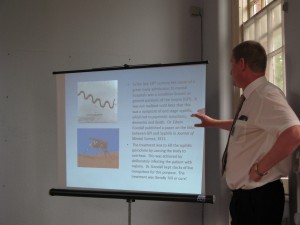
Tim's talk
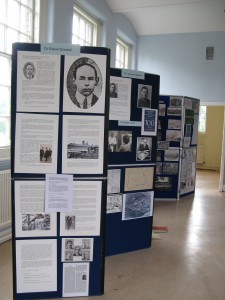
The Display
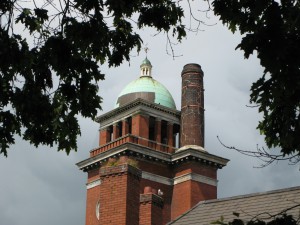
The Water Tower
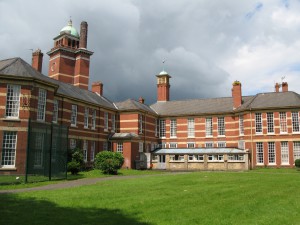
The East Side Of The Hospital
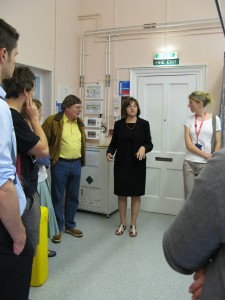
Dr Maria Atkins talk
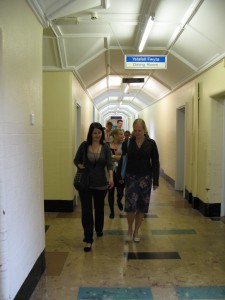
The Tour
Ex-nurse Myfanwy Lewis has spent a lifetime looking after others but was on the receiving end of some love, care and attention when she turned 100.
Myfanwy, from Rhiwbina, Cardiff, celebrated with friends at the Gabalfa Day Centre, which she has visited three times a week for the past six years.
As well as a celebration with her family, the staff at the centre – where Myfanwy enjoys bingo and quizzes – had organised a buffet and flowers for her.
Myfanwy was born in Willesden Green, London, but moved to Welshpool in Powys when she was seven.
She later came to Cardiff when she began training and working as a psychiatric nurse at Whitchurch Hospital. During World War II, she played a vital role serving her country after psychiatric patients were moved out and injured servicemen from the Battle of Dunkirk were treated there.
But fun-loving Myfanwy said they still managed to have a good time, despite the ongoing war effort. She said: “Some of them were upset and distressed.
“But some of them were quite funny – and well enough to go to the Hollybush pub. “We looked after them and used to take them over the Hollybush for a drink.”
At the end of the war, Myfanwy was wed to husband Roy and they set up home on College Road, Whitchurch. Myfanwy briefly gave up nursing after having two sons, David, 64, and Richard, 61.
But in 1957 the family moved to Llanishen and Myfanwy resumed her career, becoming a private night nurse in Cyncoed.
Later, she worked as a sales assistant in Howells department store until she retired. In 1997, Roy passed away and Myfanwy now lives with son David in Rhiwbina.
She says turning 100 “doesn’t feel any different”. “I very much enjoyed the celebration they put on for me at the day centre,” she said.
“But turning 100 doesn’t feel any different. I don’t feel any different at all.”
Thanks to Julia Harper for spotting this article in the Echo.
As one of our comments resulted in such a good response from the Historical Society I thought I would give some more information in a post.
The Mental Treatment Act 1930
Under the highly legalistic and bureaucratic ‘Lunacy Act of 1890’, individuals were usually admitted to an ‘asylum’ following a formal, legal process that resulted in the person being ‘certified’ (received into hospital via a legal ‘reception order’- signed by a justice of the peace and accompanied by medical recommendation(s)) for care and treatment. Such admission requirements were modified according to whether the patient was of ‘private’ or ‘pauper’ status, and the degree of perceived urgency for such admissions. The 1930 ‘Mental Treatment Act’, which came into force on 1st. January 1931, established a less formalised system of admission, making a new provision for ‘voluntary’ admissions.
‘Voluntary patients’ sought admission for assessment and treatment under their own ‘free will’, without the need for the formalised legal process of ‘certification’. The person could also discharge themselves voluntarily, giving 72 hours notice to do so. For the first time, too, individuals could seek voluntary treatment within hospital, as an outpatient.
Reflecting changing social trends and attitudes, the 1930 Act also replaced terms such as ‘lunacy’, ‘lunatic’ and ‘asylum’ with the terms ‘mental illness’, ‘person of unsound mind’ and ‘mental hospital’.
The 1930 Act was also an attempt to demystify and destigmatise ‘mental illness’ per se, and to place it on a par with physical illness. Indeed, the second physician superintendent of Whitchurch Hospital, Dr. McKeowan, hailed the new Act as a ‘Magna Carta’ for patient rights and liberty.
Thanks to Mike Jones for this contribution.
Below are photos of a series of plaques hanging on the wall near the entrance of the Hospital, does anyone know their history?
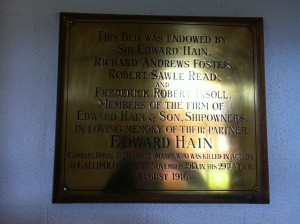
Sir Edward Hain
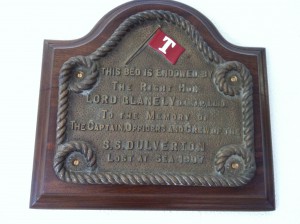
Lord Glanely
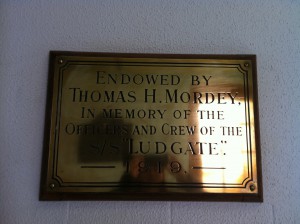
Thomas H. Mordey
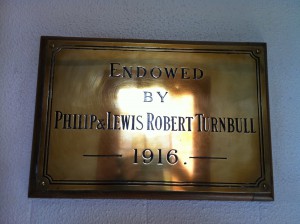
Philip & Lewis Robert Turnbull
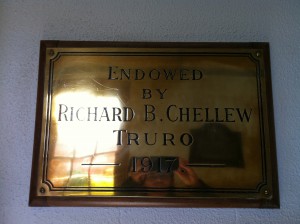
Richard B. Chellew
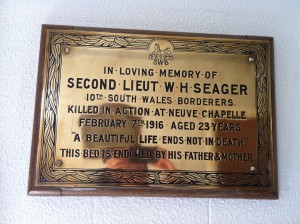
Second Lieut W H Seager
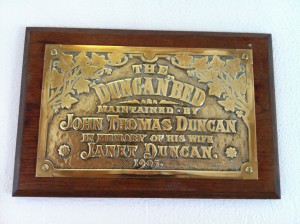
The Duncan Bed
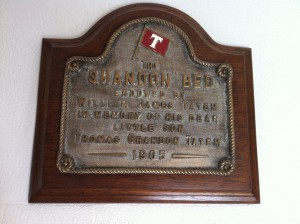
Shandon Bed
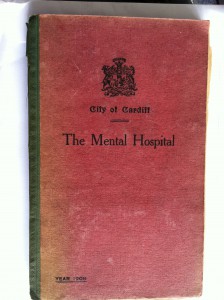
First Annual Report
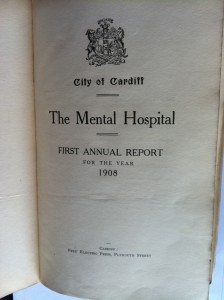
First Page
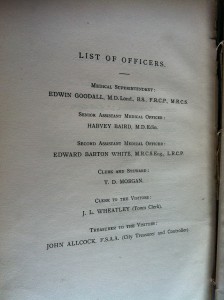
List of Officers
Annual Report of the Committee of Visitors
At the Meeting of the Committee of Visitors, held at the Mental Hospital on the 27th May, 1909, the following Annual Report to the City Council was drawn up in accordance with Section 190 of the Lunacy Act, 1890.
State and Condition of the Institution
At the date of this report the Mental Hospital has been in working for a little over one year. The building contractors (Messrs. William King and Son, Westminster) removed from the premises about two months ago, but the committee is in communication with the Architects as to the completion and making good of certain defects.
…/…
It has, however, been found that in order efficiently to heat at any time certain of the Male Wards which face eastwards, and to heat any of the wards on the first floor during the prevalence of sharp east winds, a very large consumption of steam coal, with continuous day and night stoking, is necessary if the hot-water pipes are to be relied upon.
…/…
Regard has been had to the important consideration that the primary aim of the Institution is the cure of the patients, and every endeavour has been made, and will be maintained, to furnish all available means for bringing about cure in recoverable cases. In this way it is believed that the confidence of the public will be promoted, and patients sent for treatment on the first manifestations of symptoms of mental disease.
…/…
The committee has also pleasure in reporting that the conduct of the subordinate staff has been in general very satisfactory.
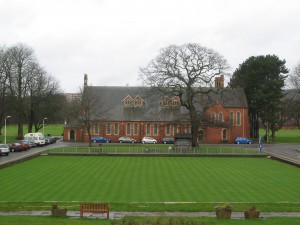
Whitchurch Hospital Chapel